Share
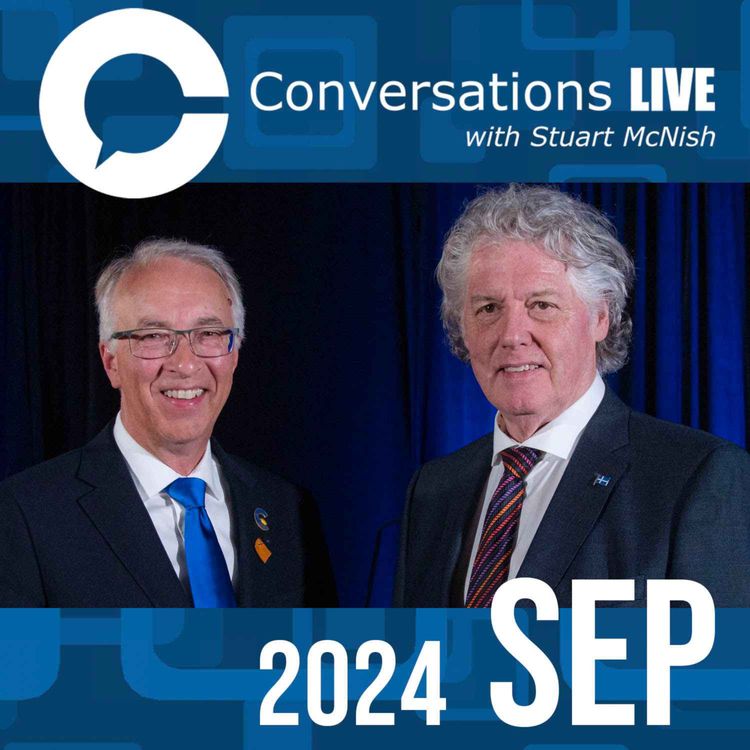
Conversations Live with Stuart McNish
The Leaders Series – Part 2: John Rustad
Join us for a series of wide-ranging conversations with BC’s provincial political leaders the week of September 16.
Kicking off our third season, the Leaders Series will be three conversations over the week – all unscripted, unrestricted, and focused on the topics on British Columbians’ minds as we come into the October election. As always, we will take questions from our webcast audience over Slido.
The series will start with a conversation with Green Party leader Sonia Furstenau 7 p.m. Monday, September 16, followed by BC Conservative Party leader John Rustad 7 p.m. the next day – Tuesday, September 17. BC NDP leader Premier David Eby will join us Thursday, September 19 at 4:15 p.m.
There’s a lot to discuss. The political landscape has shifted with BC United exiting the campaign. The economy, toxic drugs, health care, crime, housing, infrastructure investment, the climate, food & agriculture, our resource economy and tech sectors, education all feature in the upcoming election, less than two months away.
We hope you can join us for these conversations – as always, webcast by our media partner, the Vancouver Sun, and on our own website.
More episodes
View all episodes
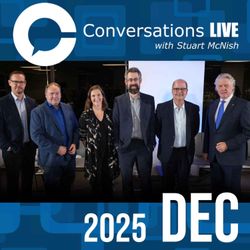
4. Cybersecurity
01:14:17||Season 4, Ep. 4Conversations Live took a deep dive into one of the most urgent issues of our time: Cybersecurity.From AI-powered deepfakes to the rising cost of cybercrime in Canada, our expert panel broke down the threats and the opportunities shaping our digital future. Vancouver’s growing role as a cybersecurity hub was a standout theme.A big thank-you to our panel: Milos Stojadinovic (RBC), Erik Berg (KPMG), Bijan Sanii (INETCO), Dominic Vogel (Vogel Cybersecurity Leadership), Michael Argast (Kobalt.io) and Katie Fitzmaurice (Invest Vancouver).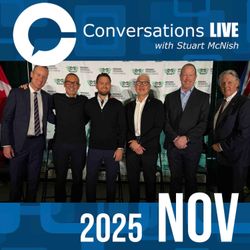
3. Unlocking BC's Economy: Innovative First Nations Partnerships
01:01:36||Season 4, Ep. 3The B.C. economy continues to shrink but we are looking for creative ways to turn the tide! Conversations Live is partnering with the Indigenous Partnership Success Showcase to spotlight the innovative collaborations that are bringing growth back to the province.Our panel will bring together leaders driving progress through partnership and entrepreneurial thinking. Featuring:Chief Derek Epp, Ch’íyáqtel First NationCatherine Pennington, KPMGStephen Lee, Musqueam Capital CorpJeff Mycock, West FraserBob Rennie, rennie IntelligenceHosted by Stuart McNish Be part of the conversation that’s shaping B.C.’s economic future and celebrate the partnerships and ideas unlocking growth in British Columbia!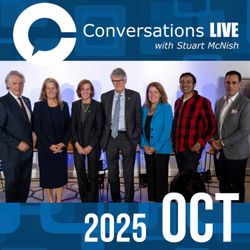
2. BC's Innovation Economy - Can we Train, Retain and Attract the Best & Brightest?
01:15:27||Season 4, Ep. 2With British Columbia’s economy on a slow downward trajectory, one question stands out:Can the innovation economy boost the province’s performance?The answer might be yes if we can train, retain, and attract the best and brightest minds. But that’s no easy task in a world competing fiercely for talent.Recent U.S. policy changes, including a $100,000 H-1B visa fee, could give BC an unexpected advantage. But can our strengths outweigh our challenges?Join Stuart McNish and an exceptional panel of leaders as they unpack what it will take for BC to lead in innovation and talent attraction:Allen Eaves, STEMCELL TechnologiesSue Paish, DigitalMarc Low, KPMGLisa Sparrow, CorixWendy Hurlburt, Life Sciences BCKarn Manhas, Terramera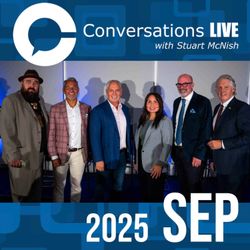
1. Investing in BC in Partnership with First Nations
01:01:19||Season 4, Ep. 1Canada and BC are introducing legislation to fast-track major projects in energy, mining, forestry, and infrastructure. On the surface, it signals that investment is welcome in our nation again.But here’s the reality: without meaningful consultation and partnership with First Nations, these projects risk delays or outright failure.That’s why projects developed with Indigenous communities move faster, gain approvals more smoothly, and succeed more often.Join Stuart McNish for the season premiere of Conversations Live as he speaks with a remarkable panel of leaders about how Indigenous partnerships are reshaping Canada’s development landscape:Crystal Smith - Former Chief Councillor, Haisla NationMark Magnacca - Co-Chair, Canadian Indigenous Investment SummitJP Gladu - Principal, MokwatehGlen Clark - Chair, BC HydroDallas Smith - President, Nanwakolas CouncilMike McPhee - Executive Chairman, Falkirk Consulting Ltd.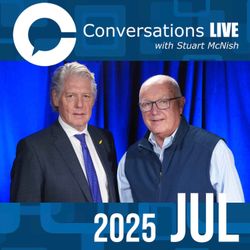
21. Canada - US Relations?: One on One with Ambassador Hoekstra
34:23||Season 3, Ep. 21On Thursday, July 24 at 5 p.m., Conversations Live welcomes Pete Hoekstra, the newly appointed U.S. Ambassador to Canada, for an exclusive and timely discussion on the evolving relationship between our two nations.From long-standing trade partnerships to moments of political tension, the Canada-U.S. relationship has been described as both special and complicated. In this live episode, Ambassador Hoekstra joins host Stuart McNish to explore the economic, diplomatic, and security issues that continue to define our cross-border ties.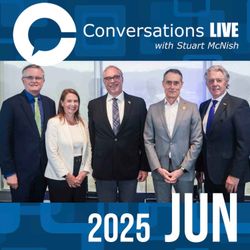
20. The Energy Trilemma: Accessibility, Sustainability, Affordability
01:08:24||Season 3, Ep. 20Energy access and sustainability are at the heart of Canada's economy and British Columbia is facing a pivotal moment.How can we ensure energy security, equitable access, and environmental responsibility in a rapidly evolving landscape?Join us on Conversations Live for a timely and thought-provoking panel on June 17 at 5:30 PM. We’ll explore BC’s current energy mix, still dominated by electricity and fossil fuels, and the practical realities of transitioning to alternatives.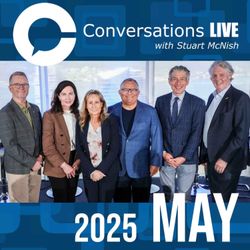
19. Live Long & Prosper
01:06:23||Season 3, Ep. 19Growing old isn't for the faint of heart.Physical health, mental health, financial health, and loneliness are some of the issues we all face as we clear the 70-year mark.What is it about British Columbia that we're near the top of the global longevity spectrum?As you age do you fear health care resources, mental health resources, a lack of social services, a lack of social networks, or a lack of money?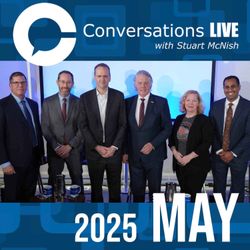
18. Permit to Prosperity - the Sequel
01:01:59||Season 3, Ep. 18The economic opportunities mining presents are enormous, however, the Trump Administration has thrown a wrench into the development of North American critical minerals. "The demand for critical minerals in the United States is not going to change" says Michael Goehring of the Mining Association of British Columbia, "the US has two choices of supply China and Canada. The US needs our critical minerals."BC currently has 17 critical mineral projects awaiting approval, four of which are on Premier Eby's list of natural resources projects, there's another five precious metal or gold projects under development. Goehring says, "those projects represent a generational opportunity for British Columbia's economy."Join us on Tuesday May 6 as our panel outlines the opportunities, the roadblocks and the solutions to igniting the province's economy.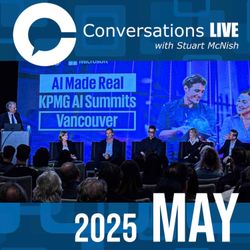
17. Quantum AI - A Team Canada Game Changer
46:12||Season 3, Ep. 17AI is not just a tool for efficiency but a strategic enabler for strengthening Canada’s competitiveness, innovation, resilience, and long-term prosperity during a time of geopolitical uncertainty. Industry leaders will share real-world strategies for integrating AI and overcoming adoption challenges for the benefit of Canadian companies and the economy.